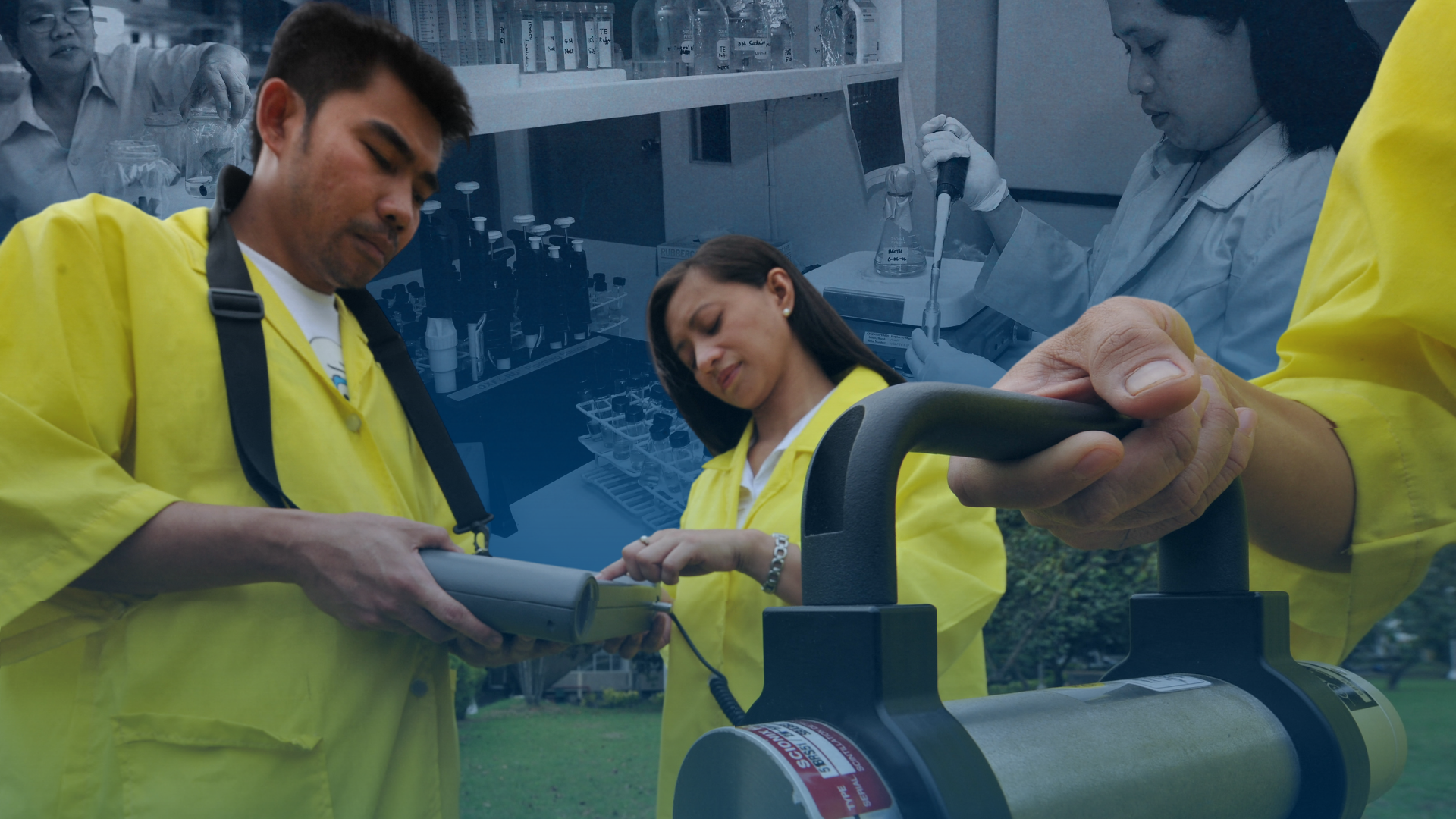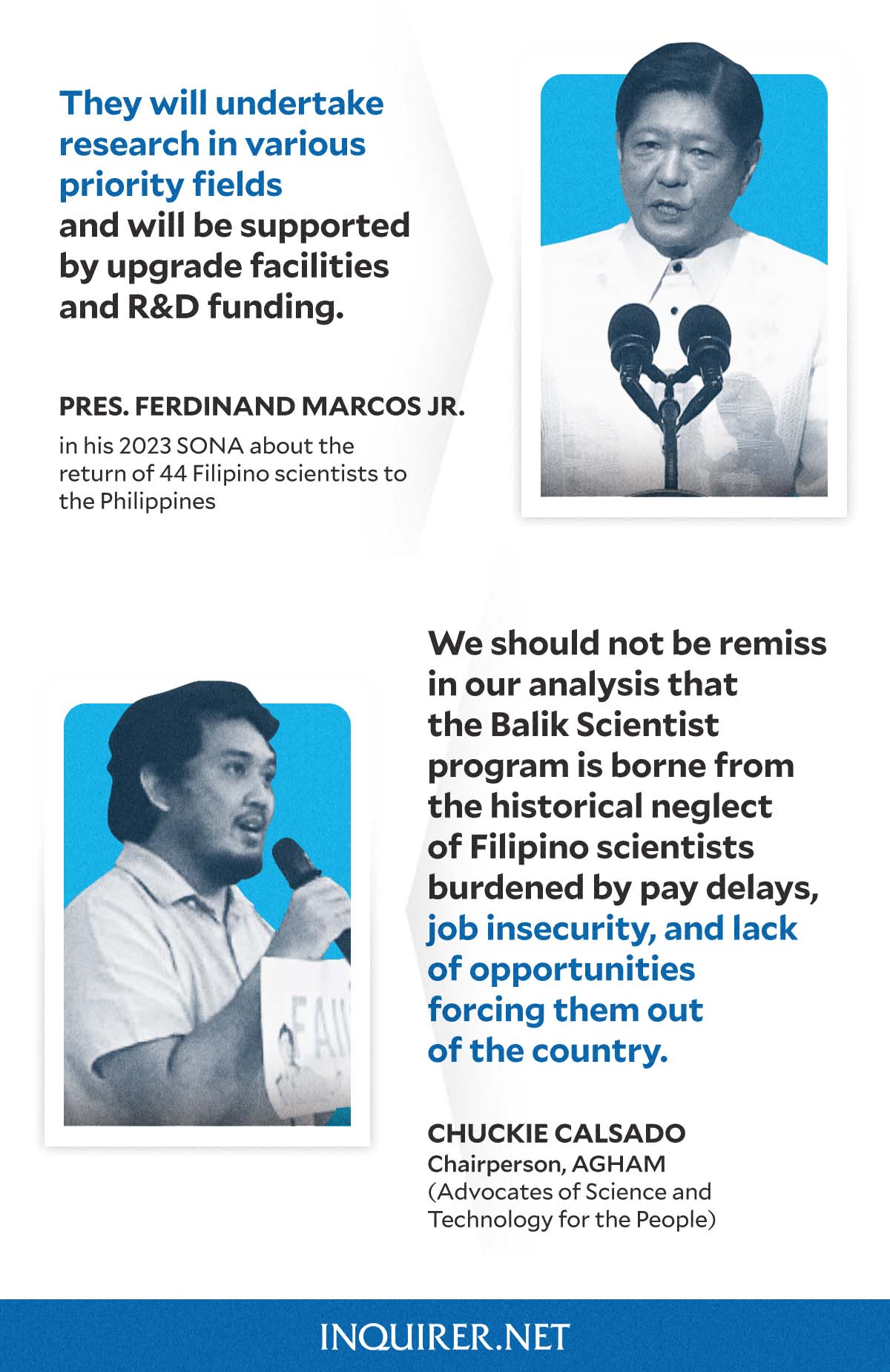‘Balik Scientist’: It’s gov’t fault they left in the first place
MANILA, Philippines—When President Ferdinand “Bongbong” Marcos Jr., in his second State of the Nation Address, stressed on a program to lure Filipino scientists to return to the Philippines, a group of scientists and science advocates minced no words in its criticism.
Advocates of Science and Technology for the People (Agham), a group of Filipino scientists and advocates, said the emphasis made in the second Sona on the program to bring back Filipino scientists illustrated a “tactic of weaponizing half-truths by hiding behind relative and absolute numbers.”
Agham said the lack of factual basis for some of Marcos Jr’s statements was an attempt to mask government “deficiencies and inutility.”
The group pointed to what it said was the inadequacy and insincerity of the Balik Scientist Program, which Marcos Jr. highlighted in his second Sona.
“To address the challenge of staying at the cutting-edge of technology, 44 renowned Filipino scientists in diverse areas of expertise have returned home under the Balik-Scientist Program,” the President said.
“They will undertake research in various priority fields and will be supported by upgraded facilities and [research and development] (R&D) funding,” he added.
READ: SONA 2023: President Bongbong Marcos Full Speech
Agham said the government overly romanticizes the program to highlight benefits to Filipinos while failing to state that it’s a program that tries to recover what the country has lost due to what the group said was deliberate government neglect of Filipino scientists.
“It is commendable that Filipino scientists, due to their inherent love of our country, continue to return and serve,” said Agham chairperson Chuckie Calsado.
“[B]ut we should not be remiss in our analysis that the Balik Scientist Program is borne from the historical neglect of Filipino scientists burdened by pay delays, job insecurity, and lack of opportunities forcing them out of the country,” Calsado added.
Balik Scientist Program
On June 15, 2018, then-President Rodrigo Duterte signed Republic Act No. 11035, or Balik Scientist Act.
According to then-Sen. Paulo Benigno “Bam” Aquino IV, principal author of the measure, the Balik Scientist Act would institutionalize the Balik Scientist Program, which was first launched in 1975.
The law aims “to bring back Filipino scientists, engineers, and technology entrepreneurs to work in various fields, including health, food and agriculture, information and communications technology (ICT), and even alternative energy.”
READ: Senate approves ‘Balik Scientist’ bill on final reading
Based on the implementing rules and regulations (IRR) of the Balik Scientist law crafted by the Department of Science and Technology (DOST), all “balik scientists” under short-term, medium-term, or long-term engagements shall be eligible for general benefits, incentives, and privileges.
Last year, Science and Technology Secretary Renato Solidum said the proposed Virology Institute of the Philippines (VIP)—the country’s own virology and vaccine research facility—would tap into the ingenuity and expertise of Filipino scientists abroad to help the country “fully develop” the institute through the Balik Scientist Program.
READ: PH virology institute: What to know
Growing recognition, shrinking budget
Days before Marcos Jr. delivered this year’s Sona, Agham recalled how the President presented himself as a ‘frustrated scientist” and the several statements he made a year ago on prioritizing scientific research and development since stepping into office.
“These include the commitment to coordinate research and development (R&D) efforts across agencies to ensure it directly answer the needs of Filipinos, encouraging scientists to stay in the country saying that opportunities will be made available for them, and asking concerned agencies to provide more scholarships to Filipino students,” the group said.
The group referred to Marcos Jr.’s keynote speech at the opening of the 8th Annual Balik Scientist Convention in October last year, where he called himself a “frustrated scientist.”
“I am a frustrated scientist. All my scholastic career was spent in science, and it was only towards the end that it was explained to me by my father that the field is difficult, you will not get rich,” Marcos Jr. said.
READ: ‘Frustrated scientist’ Bongbong Marcos cites benefits of science and technology
Agham, however, noted that research and development had seen no significant improvement despite the President’s “grand” pronouncements.
The group detailed that the budget allocated for research and development has been steadily declining. It fell to ₱17.9 billion or 0.3 percent of the national budget for 2023 from ₱23.8 billion R&D-tagged expenditures in 2021.
Data from the Department of Budget and Management (DBM) showed that the national budget for the advancement of R&D across different sectors for 2023 amounted to a total of ₱18.6 billion.
DBM explained that this allocation includes the budget for R&D of general public services, defense, public order & safety, economic affairs, environmental protection, health, recreation, culture, and religion, education, and social protection sectors.
“Science and technology workers are directly affected by this situation, as exemplified by the prevalence of delayed wages among research assistants in institutions such as the University of the Philippines,” Agham said.

